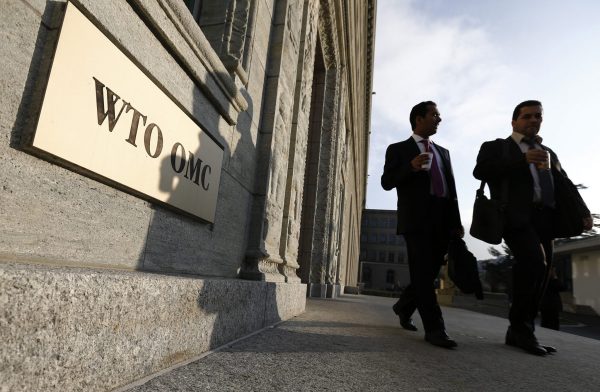The multilateral trading system, as embodied in the World Trade Organization (WTO), has been very effectively doing the job that it was created to do for many years. It has secured a foundation on which countries can base their economic planning with confidence — so much so that countries sometimes appear to take the stability and predictability of the trading system for granted in their economic planning. I deal with trade ministers on a daily basis, but it’s rare that I have a finance minister on the phone asking about the outlook for the global trading system. It is assumed that the system is a simple fact of life. Yet with goods and services exports representing 28 per cent of global GDP this is no small part in the shaping of economic plans and strategies for economies — large and small, developed and developing.
Imagine, however, if we were suddenly presented with a scenario where the system started to falter. If tariff levels were no longer bound at the historically low levels we see today, if we could not rely on members honouring their services commitments, or if the system of settling trade disputes was to erode, the consequences would be dramatic. If, for example, tariffs returned to the levels before the multilateral trading system was created we would see trade flows fall by 60 per cent, while the global economy would contract by 2.4 per cent. That’s even bigger than the contraction after the 2008 crisis — the biggest crisis we’ve seen in the past 80 years. It’s an extreme example, but shows just how important the trading system is.
Despite the tensions between major trading partners, trade is actually performing very well and helping to drive the global economic recovery. Global merchandise trade grew at a rate of 4.7 per cent in 2017 — the strongest performance since 2011. With economic cycles between China, the United States and the European Union re-synchronising in a way that we have not seen for a decade, this growth could be expected to continue. The estimate is that world merchandise trade volumes will grow by 4.4 per cent in 2018, and around 4 per cent in 2019.
This outlook is good news. It means that trade is playing its part in supporting growth, development and job creation.
But of course all of this could be at risk if the tensions that we have been seeing continue to escalate. The global economy is profoundly interconnected today, and this multiplies the complications that trade-restrictive actions can cause. Two-thirds of world trade now occurs through global value chains. As the economist Richard Baldwin argues, erecting trade barriers in today’s economy is like building a wall in the middle of a factory. And in an interconnected economy, the effects of any shocks to the trading system would likely be globalised, reaching far beyond those countries that are directly involved. In this scenario everyone would be affected, and poor countries would stand to lose the most.
Global cooperation will be essential in easing these tensions and safeguarding the strong growth that we are seeing today. The WTO, which was created as a forum for members to find ways to cooperate and hold each other to account, will play its proper role in this process. Indeed, we have done so before. It can be argued that without the WTO, a wave of protectionist measures would have been stirred up by the 2008 crisis, significantly worsening the economic effects of that downturn.
While the multilateral trading system is important, it must also be continually strengthened and improved so that it can meet the demands of a rapidly changing and evolving global economy — and in recent years WTO members have succeeded in delivering a number of important reforms. Major breakthroughs include the 2013 Trade Facilitation Agreement, the 2015 agreement to eliminate agricultural export subsidies, and a series of steps to support the WTO’s least-developed members. In 2015, a group of members struck a deal to expand the Information Technology Agreement, which eliminates tariffs on a wide range of information technology products.
At the WTO’s Ministerial Conference, held in Buenos Aires in December 2017, members took further steps. For example, they committed to securing a deal on fisheries subsidies which delivers on Sustainable Development Goal 14.6 by the end of 2019, they agreed to extend the practice of not imposing customs duties on electronic transmissions for another two years, and they agreed to continue negotiations in other areas including agriculture, services and market access. Groups of members — encompassing participants from developed, developing and least-developed countries — announced new initiatives to explore talks at the WTO on the issues of electronic commerce, investment facilitation, micro-, small- and medium-size enterprises and women’s economic empowerment. Work on all of these fronts continues in Geneva.
These efforts to reform and improve the trading system are vital, but we should also remember the inherent value of what we have. Cooperation on trade, through the WTO, is fundamental to the global economy as we know it today. This cooperation is a precious resource — and in the years to come I will be working to ensure that we see more of it, not less.
Roberto Azevêdo is the Director-General of the World Trade Organization.

